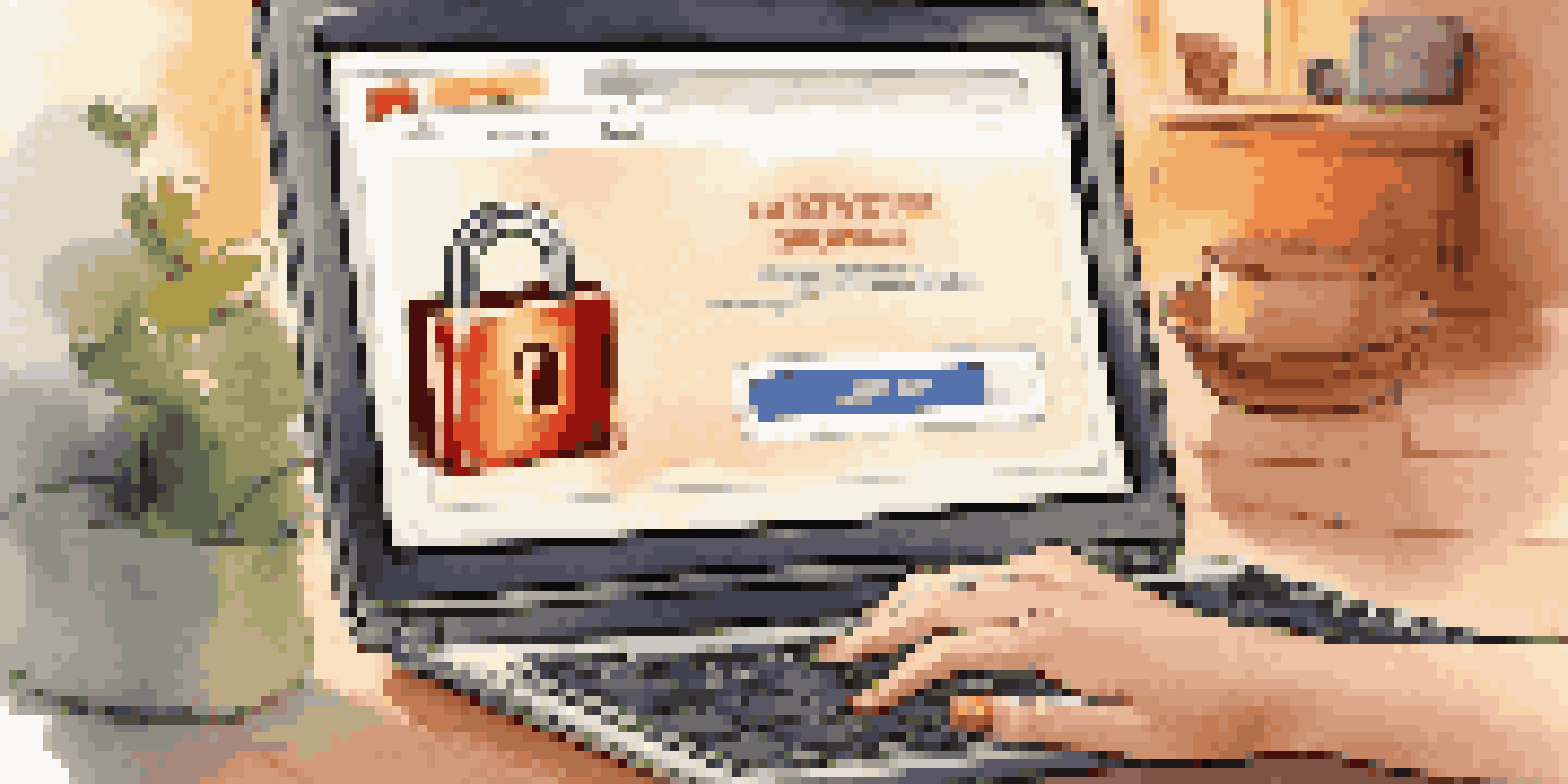Best Practices for Secure Online Transactions and Payments

Understand the Importance of Secure Transactions
In today's digital world, securing online transactions is more important than ever. Every time you make a purchase, sensitive information such as your credit card details and personal data is exchanged. Understanding the risks involved can help you make informed decisions to protect yourself.
In the world of cybersecurity, there are two types of people: those who have been hacked and those who will be.
Cybercriminals are always on the lookout for unguarded opportunities to steal personal data. By recognizing the importance of secure transactions, you'll be better equipped to spot potential threats and mitigate them before they become a problem. This awareness is the first step in ensuring a safer online shopping experience.
Ultimately, prioritizing secure transactions not only protects you but also fosters trust in the online marketplace. When consumers feel secure, they are more likely to engage in e-commerce, benefiting everyone involved.
Use Secure Websites with HTTPS
One of the simplest yet most effective practices for secure online transactions is to ensure the website uses HTTPS instead of HTTP. The 'S' in HTTPS stands for 'Secure,' indicating that the site has an added layer of encryption for data transfer. This encryption helps protect your information from being intercepted by malicious actors.

When shopping online, look for a padlock icon in the address bar, which signifies that the site is secure. If you don't see this icon, it might be wise to reconsider entering any personal information on that site. Trustworthy websites will always prioritize your security and display these indicators clearly.
Secure Transactions Are Essential
Understanding the importance of secure online transactions helps protect sensitive information and fosters trust in e-commerce.
In addition to protecting your data during transactions, using HTTPS can also help improve your browsing experience. Websites that use HTTPS are generally faster and more reliable, making your online shopping not just safe, but also seamless.
Utilize Strong Passwords and Two-Factor Authentication
When it comes to securing your online accounts, strong passwords are your first line of defense. A good password should be complex, combining letters, numbers, and symbols, and avoiding easily guessable information like birthdays or pet names. Using a unique password for each account is crucial to minimizing risk.
Security is not a product, but a process.
To take your security a step further, consider enabling two-factor authentication (2FA) wherever possible. This adds an extra layer of protection by requiring a second form of verification, such as a text message code or an authentication app, whenever you log in. It can be a small hassle, but it significantly enhances your security.
Remember, even the strongest password can be compromised if not properly managed. Regularly updating your passwords and using password managers can help keep your online transactions secure.
Monitor Your Financial Statements Regularly
Keeping an eye on your financial statements is a critical practice for spotting unauthorized transactions. Regularly reviewing your bank and credit card statements allows you to detect any suspicious activity early on. If you notice something amiss, alert your bank immediately to minimize potential damages.
Many banks now offer mobile apps that provide real-time notifications for transactions, making it easier than ever to keep track of your spending. Take advantage of these tools to stay informed about your account activity. This level of vigilance can help you catch fraud before it escalates.
Use HTTPS for Safer Browsing
Choosing websites with HTTPS ensures that your data is encrypted, making online shopping safer and more reliable.
In addition to monitoring your accounts, consider setting up account alerts for large transactions or unusual activity. This proactive approach can add another layer of security to your online financial dealings.
Be Cautious with Public Wi-Fi Networks
Using public Wi-Fi networks can be convenient, but they often come with significant security risks. Cybercriminals can easily access unsecured networks to intercept your data, making it risky to conduct online transactions. If you must use public Wi-Fi, be extra cautious about the information you share.
One way to protect yourself is to use a Virtual Private Network (VPN). A VPN encrypts your internet connection, making it much harder for anyone to snoop on your online activities. This is especially important when accessing sensitive information or making purchases.
If a VPN isn't an option, consider avoiding financial transactions on public Wi-Fi altogether. It's better to wait until you're on a secure network to make those important purchases.
Stay Informed About Security Threats
Staying informed about the latest security threats is essential for protecting yourself during online transactions. Cybersecurity is an ever-evolving field, and new scams and tactics emerge regularly. Following reputable tech news sources or subscribing to security alerts can help you stay one step ahead.
Additionally, educating yourself about common online scams can make you more vigilant. For example, phishing scams often trick users into providing personal information by pretending to be legitimate companies. Recognizing these red flags can help you avoid falling victim to such traps.
Monitor Finances for Fraud Detection
Regularly reviewing financial statements and setting up alerts can help you quickly identify and address unauthorized transactions.
Remember, knowledge is power. The more you know about potential threats, the better prepared you'll be to navigate the online landscape safely.
Utilize Secure Payment Methods
Choosing the right payment method can significantly enhance the security of your online transactions. Credit cards often provide better fraud protection compared to debit cards, making them a safer option for online purchases. Additionally, consider using digital wallets like PayPal or Apple Pay, which add layers of security by not sharing your card details directly with merchants.
Secure payment methods often come with buyer protection policies, which can further safeguard your transactions. If something goes wrong with a purchase, these policies can offer refunds or resolve disputes more easily. Always read the terms and conditions of your payment method to understand your protections.

Furthermore, avoid using wire transfers for online payments, as they usually lack the same level of consumer protection as other methods. Sticking to established, secure payment options can give you peace of mind while shopping online.
Regularly Update Your Devices and Software
Keeping your devices and software up to date is a crucial step in maintaining online security. Software updates often include patches for known vulnerabilities that cybercriminals might exploit. By regularly updating your operating systems, browsers, and apps, you ensure that you have the latest security features at your disposal.
This is especially important for security software, such as antivirus programs, which need to be updated to defend against new threats. Make it a habit to check for updates weekly or set your devices to update automatically. A few minutes spent on updates can save you from potential security breaches.
Additionally, consider uninstalling any outdated or unused applications. Old software can pose risks, as they may not receive regular updates and could become gateways for cyber attacks.